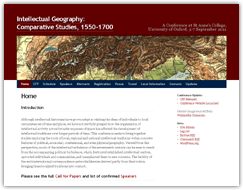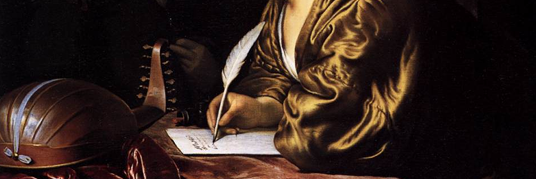* You are viewing the archive for November, 2010
 The CFP for the next Project conference, Intellectual Geography: Comparative Studies, 1550-1700, to be held at St Anne’s College, University of Oxford from 5-7 September 2011, has now been released. Confirmed keynote speakers include Professor Miles Ogborn (Queen Mary, University of London) and Professor Thomas DaCosta Kaufmann (Princeton University). The conference will explore prospects for an analytical geography of the concrete spatial features both underpinning national and international networks of learned correspondence and nurturing the intellectual traditions exchanged through those networks. It will examine the material conditions structuring epistolary communication, the geographical features conditioning local, regional, and national intellectual traditions, and the ideas generated when international networks brought these localized traditions into contact. At the centre of the conference will be a comparison of how the radically different physical, political, and confessional geographies of England and the Holy Roman Empire structured intellectual activity in manners radically different and hitherto unappreciated, and how the wars and reformations of the seventeenth century cross-fertilized these traditions in highly significant ways. The deadline for abstracts is 1 April 2011. For the full CFP, please visit the conference microsite.
The CFP for the next Project conference, Intellectual Geography: Comparative Studies, 1550-1700, to be held at St Anne’s College, University of Oxford from 5-7 September 2011, has now been released. Confirmed keynote speakers include Professor Miles Ogborn (Queen Mary, University of London) and Professor Thomas DaCosta Kaufmann (Princeton University). The conference will explore prospects for an analytical geography of the concrete spatial features both underpinning national and international networks of learned correspondence and nurturing the intellectual traditions exchanged through those networks. It will examine the material conditions structuring epistolary communication, the geographical features conditioning local, regional, and national intellectual traditions, and the ideas generated when international networks brought these localized traditions into contact. At the centre of the conference will be a comparison of how the radically different physical, political, and confessional geographies of England and the Holy Roman Empire structured intellectual activity in manners radically different and hitherto unappreciated, and how the wars and reformations of the seventeenth century cross-fertilized these traditions in highly significant ways. The deadline for abstracts is 1 April 2011. For the full CFP, please visit the conference microsite.
Kim McLean-Fiander
November 12, 2010
Calls for Papers, Conferences and Workshops, Events, Project Updates
Tags: Censorship, Commerce, Communication, Exchange, Networks, Propaganda, Seventeenth Century

A Woman Writing a Letter (1680) by Frans van Mieris
The University of Reading Early Modern Studies Conference will take place 18–20 July 2011. Organised by the Early Modern Research Centre, the conference takes as its theme Communication and Exchange and will feature both a panel on Cultures of Knowledge and a plenary session by the Project Director Professor Howard Hotson. The conference hopes to generate new thinking and debate on such questions as: what forms did communication and information take (oral, printed, numerical, or even visual), how did its forms change, and how was it circulated; what did people know about the world outside their own immediate spheres in the early modern period; what new techniques for the calculation and expression of information appeared; how far was information managed by government through propaganda and censorship or the maintenance of secrecy; did changing practices of communication stimulate the emergence of new genres; how did the stock of knowledge of the world increase through the endeavours of seamen, merchants, factors and adventurers as well as scientists and travel writers; and what part did patronage and the commerce in books and manuscripts play? The deadline for paper and panel proposals is 31 January 2011. Further details are available in the full call for papers (pdf).
Kim McLean-Fiander
November 12, 2010
Conferences and Workshops, Events, Project Updates, Projects and Centres
Tags: Bodleian Resources, Databases, Digital Miscellanies Index, Digitization, Eighteenth Century, Electronic Enlightenment, Seventeenth Century, Union Catalogue
A report on the roundtable is now available on the CEMS blog
 On Thursday 18 November 2010, the Centre for Early Modern Studies (CEMS) at Oxford will host a roundtable presentation of three early modern digital projects, comprising Cultures of Knowledge (James Brown), Electronic Enlightenment (Robert McNamee), and the Digital Miscellanies Index (Abigail Williams and Jennifer Batt). The event will take place from 12.30-2.00pm at the Oxford e-Research Centre, 7 Keble Road. Tea and coffee will be provided, but please bring your own lunch. For more information, visit the CEMS website.
On Thursday 18 November 2010, the Centre for Early Modern Studies (CEMS) at Oxford will host a roundtable presentation of three early modern digital projects, comprising Cultures of Knowledge (James Brown), Electronic Enlightenment (Robert McNamee), and the Digital Miscellanies Index (Abigail Williams and Jennifer Batt). The event will take place from 12.30-2.00pm at the Oxford e-Research Centre, 7 Keble Road. Tea and coffee will be provided, but please bring your own lunch. For more information, visit the CEMS website.
 The CFP for the next Project conference, Intellectual Geography: Comparative Studies, 1550-1700, to be held at St Anne’s College, University of Oxford from 5-7 September 2011, has now been released. Confirmed keynote speakers include Professor Miles Ogborn (Queen Mary, University of London) and Professor Thomas DaCosta Kaufmann (Princeton University). The conference will explore prospects for an analytical geography of the concrete spatial features both underpinning national and international networks of learned correspondence and nurturing the intellectual traditions exchanged through those networks. It will examine the material conditions structuring epistolary communication, the geographical features conditioning local, regional, and national intellectual traditions, and the ideas generated when international networks brought these localized traditions into contact. At the centre of the conference will be a comparison of how the radically different physical, political, and confessional geographies of England and the Holy Roman Empire structured intellectual activity in manners radically different and hitherto unappreciated, and how the wars and reformations of the seventeenth century cross-fertilized these traditions in highly significant ways. The deadline for abstracts is 1 April 2011. For the full CFP, please visit the conference microsite.
The CFP for the next Project conference, Intellectual Geography: Comparative Studies, 1550-1700, to be held at St Anne’s College, University of Oxford from 5-7 September 2011, has now been released. Confirmed keynote speakers include Professor Miles Ogborn (Queen Mary, University of London) and Professor Thomas DaCosta Kaufmann (Princeton University). The conference will explore prospects for an analytical geography of the concrete spatial features both underpinning national and international networks of learned correspondence and nurturing the intellectual traditions exchanged through those networks. It will examine the material conditions structuring epistolary communication, the geographical features conditioning local, regional, and national intellectual traditions, and the ideas generated when international networks brought these localized traditions into contact. At the centre of the conference will be a comparison of how the radically different physical, political, and confessional geographies of England and the Holy Roman Empire structured intellectual activity in manners radically different and hitherto unappreciated, and how the wars and reformations of the seventeenth century cross-fertilized these traditions in highly significant ways. The deadline for abstracts is 1 April 2011. For the full CFP, please visit the conference microsite.



 Join
Join 